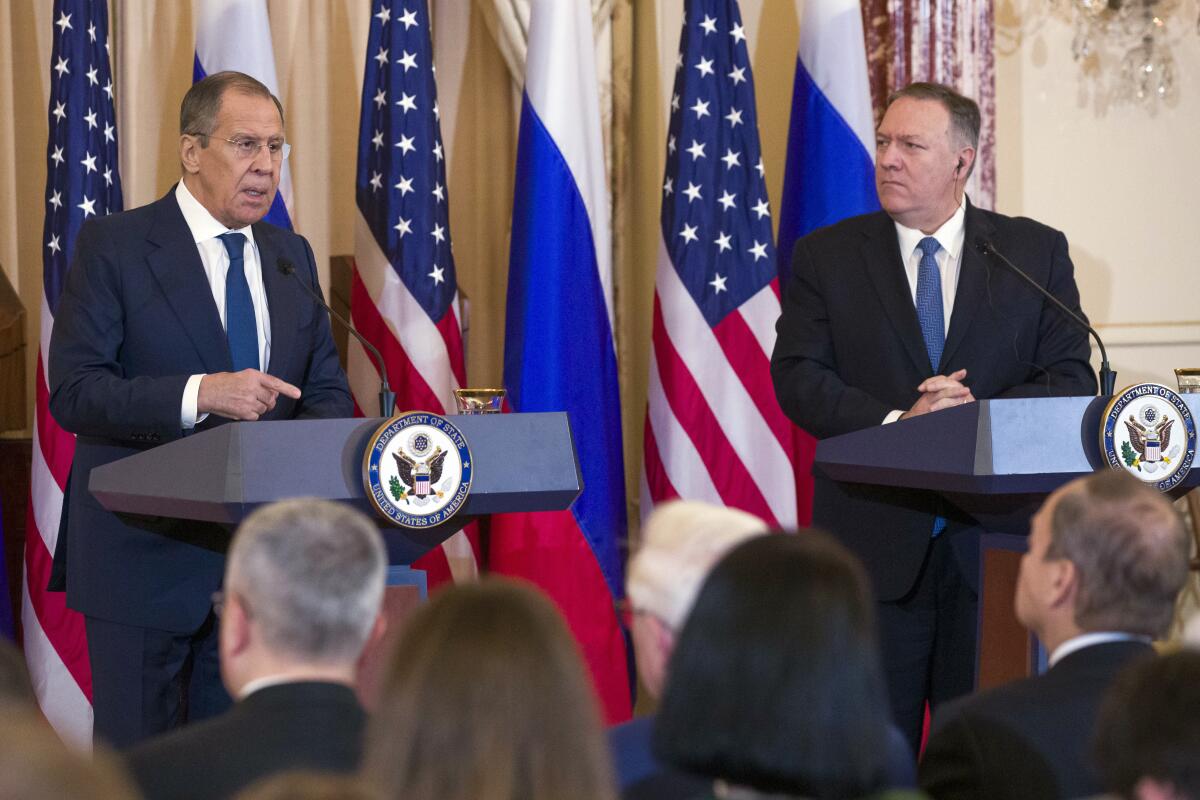White House says Trump warned Russian envoy. But did he?

WASHINGTON — For three bewildering years, President Trump has flatly dismissed, joked about or simply brushed aside Russia’s well-documented intervention in America’s 2016 presidential election.
In July 2018, during a summit with Russian President Vladimir Putin in Finland, Trump stopped just short of saying he believed Putin’s denials more than he did U.S. intelligence agencies. He later said he misspoke.
Less than a year later, Trump jokingly chided Putin at a Group of 20 summit in Japan after being asked if he would tell the Russian leader not to meddle in 2020.
On Tuesday, hours after Democrats introduced two articles of impeachment, Trump decided Russia’s meddling was worth taking seriously, the White House asserted.
During an Oval Office meeting with Russian Foreign Minister Sergei Lavrov, Trump “warned against any Russian attempts to interfere in United States elections,” according to the official White House readout of the private meeting.
The White House did not report Lavrov’s response. But shortly afterward, when Lavrov was asked about the supposed warning, he said the subject of election interference never came up during his meeting with Trump.
Earlier in the day, Lavrov had told State Department reporters that the Kremlin had not interfered in 2016.
“We have highlighted once again that all speculation about our alleged interference in domestic processes in the U.S. are baseless,” Lavrov said at a joint news conference with Secretary of State Michael R. Pompeo. “There are no facts that would support that.... No one has given us this proof because it simply does not exist.”
Pompeo implied that he disagreed with Lavrov’s characterization, adding that U.S. officials had shared evidence of Russian misconduct during the election.
“We think we’ve shared plenty of facts to show what happened in the 2016 election with our Russian counterparts,” Pompeo said. “We don’t think there’s any mistake about what really transpired there.”
“I was clear — it’s unacceptable,” he added.
Trump has been loath to accept the U.S. intelligence community’s findings, corroborated by the 22-month special counsel investigation, that Russia sought to help his campaign by influencing American voters in 2016 with hacked Democratic Party emails and disinformation about Hillary Clinton.
Lavrov’s visit to the White House came on the same day that House Democrats unveiled two articles of impeachment focusing on Trump’s alleged abuse of office, and obstruction of Congress, due to his efforts to pressure Ukraine to investigate another Democrat, former Vice President Joe Biden, who is seeking his party’s presidential nomination.
During the summer, Trump blocked $391 million in vital security aid to Ukraine, which is locked in a conflict with Russia. He also withheld a promised White House meeting to Ukraine’s president, who had sought to publicly reaffirm U.S. support for the fledgling democracy.
During Tuesday’s meeting, which lasted just under an hour, Trump and Lavrov discussed collaboration in several areas, including curbing the nuclear ambitions of Iran and North Korea, a cease-fire in Ukraine, a U.S. trade deal with China, and improving U.S. relations with Moscow, according to the White House readout.
Democrats had expressed alarm about Lavrov’s visit, given the timing amid impeachment and in part because his last visit to the Oval Office proved problematic.
In May 2017, Trump revealed highly classified intelligence that reportedly exposed an informant on Islamic State to Lavrov and Russia’s then-ambassador to Washington.
He also told them he was unconcerned about Moscow’s interference in the 2016 race because the United States did the same in other countries, the Washington Post reported.
That meeting came a day after Trump had fired FBI Director James B. Comey, who had been overseeing the investigation of Trump campaign contacts with Russian officials. The firing led the Justice Department to appoint special counsel Robert S. Mueller III.
The president now faces likely impeachment, in part over his efforts to blame Ukraine — not Russia — for meddling in the 2016 campaign. The FBI has found no evidence to support that claim.
“We have no information that indicates that Ukraine interfered with the 2016 presidential election,” FBI Director Christopher A. Wray told ABC News on Tuesday.
Russia and Ukraine have fought in eastern Ukraine since Russian troops invaded in 2014. Putin and Ukraine’s president, Volodymyr Zelensky, agreed this week to implement a cease-fire and an exchange of prisoners by the end of the year.
More to Read
Get the L.A. Times Politics newsletter
Deeply reported insights into legislation, politics and policy from Sacramento, Washington and beyond. In your inbox three times per week.
You may occasionally receive promotional content from the Los Angeles Times.











